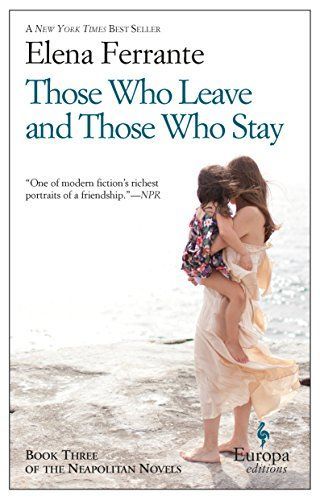
Those Who Leave and Those Who Stay
"Imagine if Jane Austen got angry & you'll have some idea of how explosive these works are" (John Freeman). Since the publication of My Brilliant Friend, Elena Ferrante has gained admirers among authors—Jhumpa Lahiri, Elizabeth Strout, Claire Messud, to name a few—and criti— James Wood, John Freeman, Eugenia Williamson, for example. But her most resounding success has been with readers, who have discovered in Ferrante a writer who speaks with great power and beauty of the mysteries of belonging, love, family, and friendship. In this third Neapolitan novel, Elena and Lila have become women. Both have attempted pushing against the walls of a prison that would have seen them living a life of misery, ignorance and submission. They are afloat on the great sea of opportunities that opened up during the nineteen-seventies. Yet they are still very much bound to each other by a strong, unbreakable bond.
Reviews
marlisa@marmalade
Stas@stasreads333
Tom Koss@tkoss
Eva Ströberg@cphbirdlady
Elisavet Rozaki @elisav3t
Maria@nocturnes
lauren@laureniscompletelyfine
deniz@dearsapling
kayla @kayellng
Julia Lundberg @julsbuls
moon ramirez@moonrameo
esperanza @espymagana
p.@softrosemint
Vaishali Batra@mellowandmelyn
Andrew Louis@hyfen
bug@bugspray
Mounir Bashour@bashour
Emma Friedheim@emrosemary
Fraser Simons@frasersimons
Angbeen Abbas@angbeen
Kwan Ann Tan@kwananntan
Melody Izard@mizard
Ioana-Alexandra Predan@ioanap
Dora Tominic@dorkele
Highlights
aywen@aywen
aywen@aywen
aywen@aywen
aywen@aywen
aywen@aywen
aywen@aywen
aywen@aywen
rachel@r4chll
rachel@r4chll
rachel@r4chll
rachel@r4chll
deniz@dearsapling
deniz@dearsapling
deniz@dearsapling
deniz@dearsapling
deniz@dearsapling
deniz@dearsapling
deniz@dearsapling
deniz@dearsapling
deniz@dearsapling
bug@bugspray
Page 412
bug@bugspray
Page 172
bug@bugspray
Page 65
bug@bugspray
Page 28